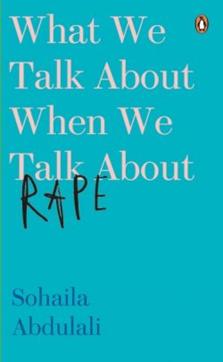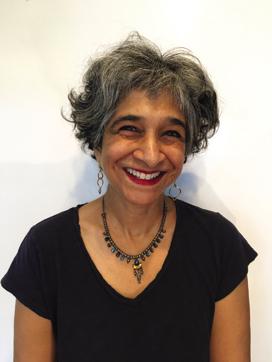Excerpt: What We Talk About When We Talk About Rape by Sohaila Abdulali
Gang-raped as a teenager, Sohaila Abdulali first wrote about her experience in Manushi magazine in 1983. Her new book examines what we think about rape. In this exclusive excerpt she writes of how every survivor imagines she has suffered less than other survivors

I am sitting in a Mumbai suburb with Kalki Koechlin, and she is telling me about the sexual abuse she lived through as a child. I am aghast at what I’m hearing.
I thank her for telling me her story, and say I cannot imagine how she has come so far in working through it. I cannot conceive how awful it must have been.
“I can’t imagine going through your experience!” she says. “I can’t think of anything worse.”
There’s something slightly unhinged about the scene: two grown women each insisting that the other deserves the prize for Worst Rape.
Is one rape worse than the other? This is a ridiculous question. Why do we insist on ranking sexual assault? Survivors do it to our own discredit. I remember sitting in a support group and thinking to myself that “my” rape wasn’t as bad as those of the other poor losers.
No matter how many stories, no matter how many victims, I’m always appalled afresh. It always sounds so terrible. “Mine” always seems more manageable.
I’m not sure why we do this. It’s a weird phenomenon that I have seen over and over. In my experience, only individuals do it. Put us in a group, and we humans are usually eager to claim the mantle of victimhood. “Collective victimhood” is well documented. But, when it comes to sitting in a room on an August afternoon and talking about rape with a fellow survivor, I’m always aghast and appalled, and convinced that the other person suffered more than me.
Perhaps there’s some defense mechanism at work. If someone else is worse off, suddenly what you’re dealing with isn’t so bad. It doesn’t always work, of course — after I had two miscarriages and one man helpfully told me about his wife’s six failed pregnancies, I just wanted to put my head in a pressure cooker and boil it. But sometimes it does.
I’m not wholly convinced about my defense mechanism theory. I know how bad my rape was, but everyone else’s still seems worse. I don’t think it’s because I’m trying to downplay my story. It’s because I know my story. I know it beyond the few sentences I’ve written, or the words I’ve used to describe it to so many people over the years. I know the tiny little details (although by now it’s pretty hazy — a rather wonderful side effect of time). I know what they did and I know what I felt and I know how bad it was. But I know I made it through. When you experience something first-hand, you know its colors and smells and the full horror of the hands pulling off your shoes. But you also know the limits of your pain and suffering. You don’t have to wonder. And reality, no matter how bad, is more manageable than unknown horror. I was never in Kalki’s position, so how do I know I would have survived? I know I survived what happened to me. No matter how bad it was, here I am. Here is the East River flowing outside my window. Here is a bowl of pomegranate seeds deeply, joyously red. Here is a little plastic pig that my spouse gave me when we first met. Here is my brother wearing a suit and tie, looking seriously at me in a photo that always cracks me up for some reason. Here I am. No matter what happened, here I am.
Whatever the reason, ranking rapes is a prime example of the magical thinking that swirls around rape. Seems like no matter how rational we are, when it comes to life’s big things — death, pain, birth, love — we quickly revert to charms and chants and magic potions. So what if it doesn’t work?
For a short time before I learned the actual statistics on rape, I thought I was safe because, now that it had happened to me, my turn was over. I was out of the running—been there, done that. This was a great comfort, until it hit me that of course you are right back in the running — rapists don’t go around asking victims whether they’ve already had their turn.
…I know that a part of me believed, and still believes, that if I just own it and know it and figure it out, then it can’t happen to me again...
While it serves no useful purpose to rank pain and suffering, we do. And of course rapes do fall into some categories — being held by warlords and gang-raped for years just isn’t in the same box as being raped by a stranger where you live, and going straight to the hospital. That’s true. But you can’t predict which woman will be able to come to terms with it sooner. Will the marital rape survivor build a new life faster than the incest survivor?
…It’s very delicate, this balancing act: to acknowledge that rape is just ghastly, and to simultaneously assert that it is simply one of many ghastly things…
Perhaps we have a basic need to rank things…

For me, the death of my father was worse than being raped, although fathers are supposed to die and children are not... I wasn’t abused for years by someone who should have been looking out for me. Maybe the childhood rape was worse because it was a malign act, whereas the child’s death was not in human control.
Maybe … See, here I go, comparing again. Why do we waste time thinking about what should be worse? It’s a futile mindgame.
I do have one absolute: the worst rape is the one you don’t survive. Jyoti Singh fought her attackers, and that rightfully makes her a hero. I would never say, or think, that she should have lain there and taken it. She might have died either way. My point is that there is no wrong way to react, but there is a worst-case outcome: you don’t get a chance to carry on.
Read more: The gender politics of moving house
In Alice Sebold’s powerful novel The Lovely Bones, the protagonist Susie Salmon is raped and murdered, and the book is told from her point of view. Reviewers loved it; so did I. But there was a fatal flaw — the wonderful heroine is dead. I don’t care how feisty and insightful and wise and unforgettable you are — once you’re dead, you’ve lost.
Marital rape. Incest. The drunk boyfriend, the family friend. For me, being gang-raped on a mountain by drug addled would-be killers seems far preferable to any of these. Crazy, but true. I could leave the mountain behind, tell myself it had nothing to do with my safe world. But anyone I know who has been raped by someone he or she knows is as aghast at my story as I was at Kalki’s. Magical thinking. I know it makes no sense, but I still think your rape is worse than mine.



